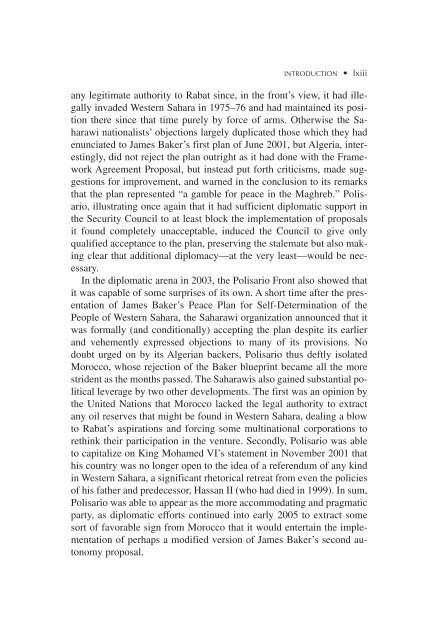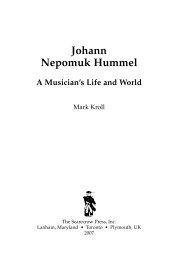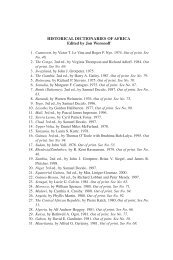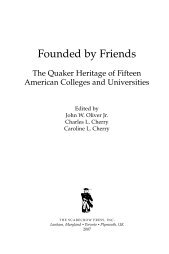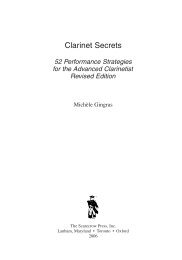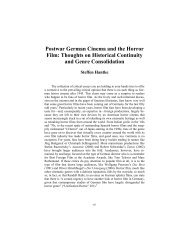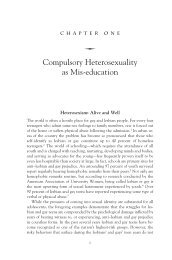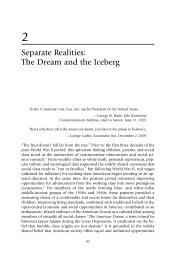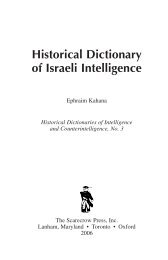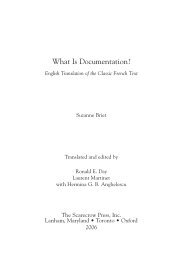Historical Dictionary of Western Sahara Third ... - Scarecrow Press
Historical Dictionary of Western Sahara Third ... - Scarecrow Press
Historical Dictionary of Western Sahara Third ... - Scarecrow Press
You also want an ePaper? Increase the reach of your titles
YUMPU automatically turns print PDFs into web optimized ePapers that Google loves.
INTRODUCTION • lxiii<br />
any legitimate authority to Rabat since, in the front’s view, it had illegally<br />
invaded <strong>Western</strong> <strong>Sahara</strong> in 1975–76 and had maintained its position<br />
there since that time purely by force <strong>of</strong> arms. Otherwise the <strong>Sahara</strong>wi<br />
nationalists’ objections largely duplicated those which they had<br />
enunciated to James Baker’s first plan <strong>of</strong> June 2001, but Algeria, interestingly,<br />
did not reject the plan outright as it had done with the Framework<br />
Agreement Proposal, but instead put forth criticisms, made suggestions<br />
for improvement, and warned in the conclusion to its remarks<br />
that the plan represented “a gamble for peace in the Maghreb.” Polisario,<br />
illustrating once again that it had sufficient diplomatic support in<br />
the Security Council to at least block the implementation <strong>of</strong> proposals<br />
it found completely unacceptable, induced the Council to give only<br />
qualified acceptance to the plan, preserving the stalemate but also making<br />
clear that additional diplomacy—at the very least—would be necessary.<br />
In the diplomatic arena in 2003, the Polisario Front also showed that<br />
it was capable <strong>of</strong> some surprises <strong>of</strong> its own. A short time after the presentation<br />
<strong>of</strong> James Baker’s Peace Plan for Self-Determination <strong>of</strong> the<br />
People <strong>of</strong> <strong>Western</strong> <strong>Sahara</strong>, the <strong>Sahara</strong>wi organization announced that it<br />
was formally (and conditionally) accepting the plan despite its earlier<br />
and vehemently expressed objections to many <strong>of</strong> its provisions. No<br />
doubt urged on by its Algerian backers, Polisario thus deftly isolated<br />
Morocco, whose rejection <strong>of</strong> the Baker blueprint became all the more<br />
strident as the months passed. The <strong>Sahara</strong>wis also gained substantial political<br />
leverage by two other developments. The first was an opinion by<br />
the United Nations that Morocco lacked the legal authority to extract<br />
any oil reserves that might be found in <strong>Western</strong> <strong>Sahara</strong>, dealing a blow<br />
to Rabat’s aspirations and forcing some multinational corporations to<br />
rethink their participation in the venture. Secondly, Polisario was able<br />
to capitalize on King Mohamed VI’s statement in November 2001 that<br />
his country was no longer open to the idea <strong>of</strong> a referendum <strong>of</strong> any kind<br />
in <strong>Western</strong> <strong>Sahara</strong>, a significant rhetorical retreat from even the policies<br />
<strong>of</strong> his father and predecessor, Hassan II (who had died in 1999). In sum,<br />
Polisario was able to appear as the more accommodating and pragmatic<br />
party, as diplomatic efforts continued into early 2005 to extract some<br />
sort <strong>of</strong> favorable sign from Morocco that it would entertain the implementation<br />
<strong>of</strong> perhaps a modified version <strong>of</strong> James Baker’s second autonomy<br />
proposal.


